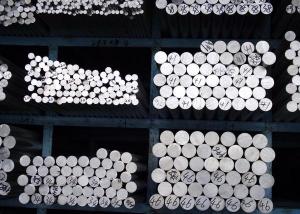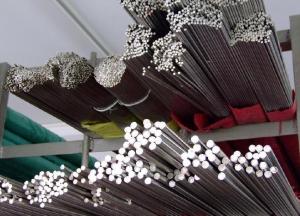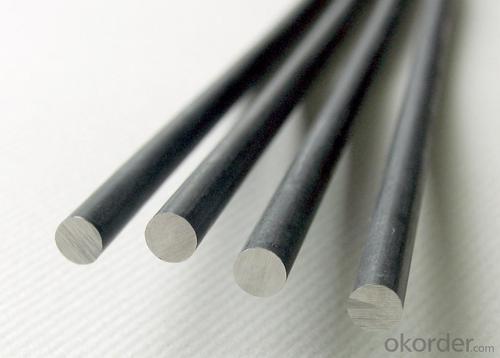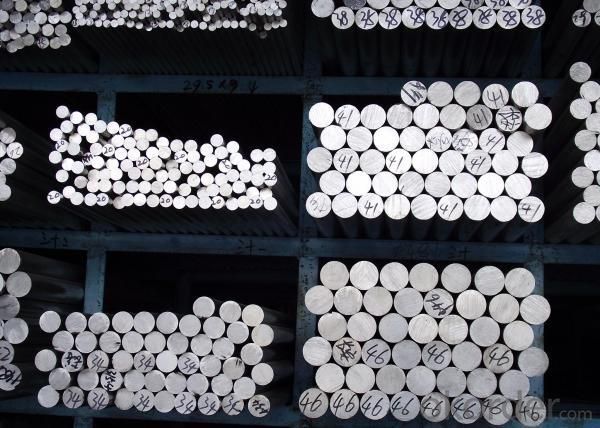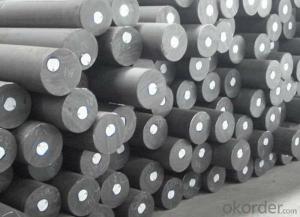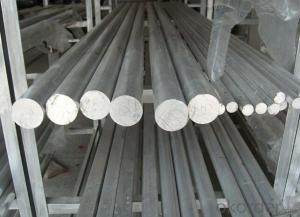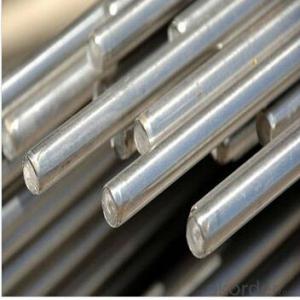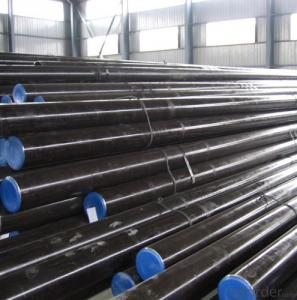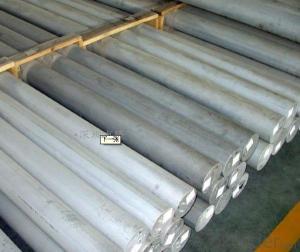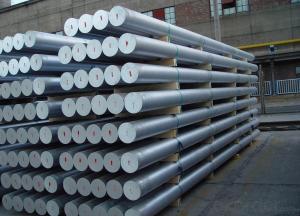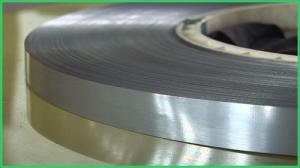Round Spring Steel
- Loading Port:
- China Main Port
- Payment Terms:
- TT or LC
- Min Order Qty:
- 50Tons m.t.
- Supply Capability:
- 600000TONS/YEAR m.t./month
OKorder Service Pledge
OKorder Financial Service
You Might Also Like
Spring Steel can be divided into two types. One is carbon spring steel, and other one is alloy spring steel.
Alloy spring steel is based on carbon spring steel, by adding one or more alloying elements to improve the mechanical properties, hardenability and other properties to meet the requirement for manufacture all kinds of spring steel.
Specification of Round Spring Steel:
-Material: 1065
-Standard: ASTM
-Production: Hot rolled or cold rolled
-Type: Spring Steel
Corresponding Steel Grade for Reference:
USA, ASTM | CHN, GB/T | JPN, JIS | ISO |
1065 | 65 | SWRH67A SWRH67B | Type SC Type DC |
FRA, NF | GBR, BS | ||
C66D | C66D |
Chemical Composition:
C | Mn | Ni | Si |
0.62~0.70 | 0.50~0.80 | ≤0.30 | 0.17~0.37 |
P | S | Cr | Cu |
≤0.035 | ≤0.035 | ≤0.25 | ≤0.25 |
Mechanical Properties:
-Tensile Strength σb (MPa): ≥695
-Yield Strength σs (MPa): ≥410
-Elongation δ10(%): ≥10
-Percentage reduction of area: ψ (%): ≥30
-Hardness HBS, no heat treatment: ≤255
Usage/Applications of Round Spring Steel:
-ASTM1065, is medium-high carbon spring steel. After heat treatment, this type of steel obtains high strength, hardness and elasticity but this material isn’t perfect for welding.
-Its fatigue strength is equal to alloy spring steel when they are in same configuration.
-For manufacturing spring, spring circle, all kinds of grommet, clutch, and axels in the production of normal machine.
Packaging & Delivery of Round Spring Steel:
-Packing Detail: The products can be packed in bundles by steel wires.
-Marks: There are two types of marks. One is color mark and other one is tag mark. We paint color marks on both ends of bundles to make sure that it’s more convenient for customers to distinguish their products from other products at the destination port. The tag marks will be tied up to each bundle to make sure that customers know the specifications of each bundle like product’s name and size and other information of products.
-Delivery Detail:
1, Delivery time: 30~45 working days after receive buyer’s T.T. or L/C.
2, Delivery status should be written in the contract. (Heat treatment or no)
Transportation:
1, The products can be delivered by bulk vessel or by container. As for container, products with the length of 6m will be loaded in 20’ container, with 9m or 12m, in 40’ container.
2, The maximum quantity of loading of container is 25 tons.
3, The products are usually transported to the nearest port from the production place.
Photos of Round Spring Steel:
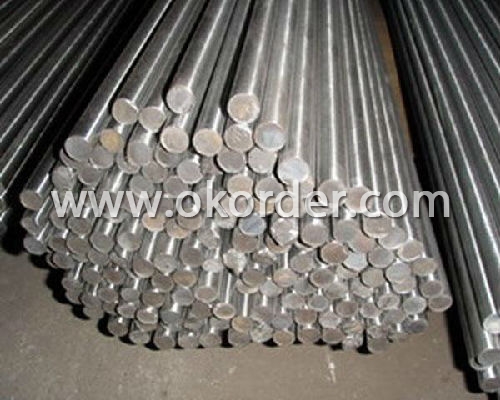
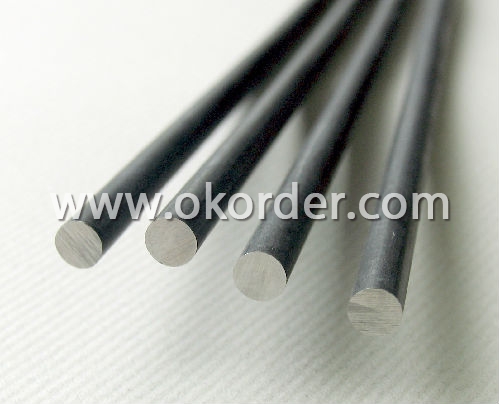
- Q: How does special steel perform in terms of creep resistance?
- Special steel performs exceptionally well in terms of creep resistance. It has been specifically engineered to withstand high temperatures and prolonged stress, making it highly resistant to deformation over time. This allows special steel to maintain its structural integrity and dimensional stability, making it an ideal choice for applications that require long-term durability under extreme conditions.
- Q: How are tool steels used in the manufacturing of cutting tools?
- Tool steels are widely used in the manufacturing of cutting tools due to their excellent hardness, wear resistance, and toughness properties. These steels are specifically designed to withstand high temperatures, intense pressures, and repetitive impacts during cutting operations. Tool steels are utilized to make various cutting tools such as drills, milling cutters, saw blades, and dies. They provide the necessary strength and durability required for cutting, shaping, and forming various materials including metals, plastics, and wood. Additionally, tool steels can be heat treated to further enhance their hardness and wear resistance, ensuring a longer lifespan and improved performance of cutting tools.
- Q: What are the main applications of special steel in the medical implants?
- Special steel is widely used in medical implants due to its unique properties and high biocompatibility. It is primarily used in applications such as orthopedic implants, cardiovascular devices, dental implants, and surgical instruments. The excellent strength, corrosion resistance, and ability to withstand sterilization processes make special steel ideal for these applications, ensuring long-term durability and patient safety. Additionally, the versatility of special steel allows for the production of complex implant designs, promoting better integration with the patient's body and enhancing overall implant performance.
- Q: How is heat-resistant steel used in high-temperature applications?
- Heat-resistant steel is used in high-temperature applications due to its ability to withstand extreme heat without losing its structural integrity. It is commonly used in industries such as aerospace, automotive, power generation, and petrochemical, where components are exposed to high temperatures. This steel is used to manufacture parts like turbine blades, exhaust systems, heat exchangers, and furnaces, ensuring reliable performance and preventing premature failure at elevated temperatures.
- Q: What are the common challenges in machining titanium alloys?
- The common challenges in machining titanium alloys include their high chemical reactivity, low thermal conductivity, high cutting forces, and poor chip control. Additionally, titanium alloys tend to work harden, making them prone to tool wear and requiring frequent tool changes. Moreover, their low modulus of elasticity can lead to vibration and chatter during machining operations, affecting surface quality and dimensional accuracy.
- Q: What are the requirements for special steel used in mining equipment manufacturing?
- The requirements for special steel used in mining equipment manufacturing are quite specific and demanding due to the harsh and challenging conditions associated with mining operations. Here are some key requirements: 1. High strength and toughness: Special steel used in mining equipment must possess excellent strength and toughness to withstand heavy loads, impact, and abrasion. This enables the equipment to withstand the demanding conditions encountered during mining operations. 2. Wear resistance: Mining equipment is exposed to abrasive materials such as rocks, ores, and minerals. Hence, the special steel used in their manufacturing needs to exhibit exceptional wear resistance properties to minimize wear and prolong the equipment's lifespan. 3. Corrosion resistance: Mining operations often take place in wet and corrosive environments, such as underground mines or near bodies of water. Special steel used in mining equipment should have good corrosion resistance to prevent rusting and degradation, ensuring the equipment's longevity and reliability. 4. Heat resistance: Mining equipment may generate significant heat during operation, especially in applications like drilling or cutting. Therefore, the special steel must have excellent heat resistance properties to withstand high temperatures without losing its strength or hardness. 5. Weldability and machinability: Special steel used in mining equipment should be easily weldable and machinable to facilitate the manufacturing process. This ensures that the equipment can be efficiently constructed, repaired, or modified as required. 6. Certification and compliance: Mining equipment manufacturers often require special steel to meet specific industry standards and certifications, such as ISO 9001, ASTM, or API. Compliance with these standards ensures that the steel used in the equipment meets the necessary quality and performance requirements. Overall, the requirements for special steel used in mining equipment manufacturing revolve around strength, toughness, wear resistance, corrosion resistance, heat resistance, weldability, machinability, and compliance with industry standards. Meeting these requirements ensures that the steel can withstand the demanding conditions of mining operations and contribute to the durability and performance of the equipment.
- Q: What are the applications of special steel in the nuclear industry?
- Special steel is extensively used in the nuclear industry due to its unique properties. It is used to manufacture various components such as reactor vessels, steam generators, and fuel cladding, which require high strength, corrosion resistance, and heat resistance. Special steel ensures the safety and efficiency of nuclear power plants by withstanding extreme temperatures, pressures, and corrosive environments. Its applications in the nuclear industry are crucial for maintaining the integrity and reliability of nuclear facilities.
- Q: How does special steel perform in magnetic fields?
- Special steel has low magnetic permeability, meaning it exhibits little to no magnetic properties. This enables it to perform well in magnetic fields by minimizing interference, distortion, or attraction to magnetic forces.
- Q: What are the properties of nitriding steel?
- Nitriding steel is a specialized process used to enhance the surface hardness and wear resistance of steel. The properties of nitriding steel include improved surface hardness, increased resistance to wear, improved fatigue strength, enhanced corrosion resistance, and reduced coefficient of friction. This process forms a hard nitride layer on the surface of the steel, making it suitable for applications in industries such as automotive, aerospace, and manufacturing, where durability and performance are crucial.
- Q: How does special steel contribute to the automotive sector?
- Special steel plays a significant role in the automotive sector by contributing to the manufacturing and performance of various automotive components. It offers several benefits that enhance the overall quality, durability, and safety of vehicles. Firstly, special steel is known for its exceptional strength and toughness. This makes it ideal for producing critical automotive parts such as engine components, chassis, suspension systems, and safety reinforcements. These components require high strength to withstand the stresses and strains experienced during vehicle operation, ensuring the safety of passengers. Furthermore, special steel provides excellent resistance to wear, corrosion, and high-temperature environments. This makes it suitable for manufacturing parts like gears, bearings, shafts, and exhaust systems, which are exposed to harsh conditions. The use of special steel in these components improves their lifespan, reliability, and overall performance, reducing maintenance and replacement costs for vehicle owners. Moreover, special steel enables the lightweighting of vehicles. Automakers are constantly striving to reduce the weight of vehicles to enhance fuel efficiency and reduce emissions. Special steel alloys, such as high-strength low-alloy (HSLA) steel, offer a unique combination of strength and lightweight properties, allowing manufacturers to design lighter and more fuel-efficient vehicles without compromising on safety or performance. In addition to its mechanical properties, special steel also contributes to the automotive sector through its versatility in manufacturing processes. It can be easily formed, welded, and machined, enabling complex shapes and designs for automotive parts. This flexibility enhances the design possibilities and allows for innovative solutions to meet the evolving needs of the automotive industry. Overall, special steel plays a crucial role in the automotive sector by providing strength, durability, and lightweight properties to various components. Its use in critical parts ensures the safety of vehicles and passengers, while its resistance to wear and corrosion improves the longevity and performance of automotive systems. With the constant drive for fuel efficiency and innovation in the automotive industry, special steel continues to be an essential material in shaping the future of automobiles.
1. Manufacturer Overview
| Location | Jiangsu, China |
| Year Established | 2003 |
| Annual Output Value | Above US$ 30 Million |
| Main Markets | Asia-Pacific; Middle east |
| Company Certifications |
2. Manufacturer Certificates
| a) Certification Name | |
| Range | |
| Reference | |
| Validity Period |
3. Manufacturer Capability
| a) Trade Capacity | |
| Nearest Port | Shanghai. |
| Export Percentage | 20% - 30% |
| No.of Employees in Trade Department | 10-20 People |
| Language Spoken: | English; Chinese |
| b) Factory Information | |
| Factory Size: | Above 100,000 square meters |
| No. of Production Lines | 2 |
| Contract Manufacturing | OEM Service Offered; |
| Product Price Range | Average |
Send your message to us
Round Spring Steel
- Loading Port:
- China Main Port
- Payment Terms:
- TT or LC
- Min Order Qty:
- 50Tons m.t.
- Supply Capability:
- 600000TONS/YEAR m.t./month
OKorder Service Pledge
OKorder Financial Service
Similar products
Hot products
Hot Searches
Related keywords

